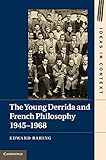The young Derrida and French philosophy, 1945-1968 [Texte imprimé] / Edward Baring
نوع المادة : نصالسلاسل:Ideas in context (Cambridge University Press, Cambridge)تفاصيل النشر:Cambridge ; New York ; Melbourne [etc.] : Cambridge University Press, 2011وصف:1 vol. (XI-326 p.) ; 24 cmتدمك:
نصالسلاسل:Ideas in context (Cambridge University Press, Cambridge)تفاصيل النشر:Cambridge ; New York ; Melbourne [etc.] : Cambridge University Press, 2011وصف:1 vol. (XI-326 p.) ; 24 cmتدمك:- 978-1-107-00967-7
- 194 23
- 194
| نوع المادة | المكتبة الحالية | المجموعة | رقم الطلب | رقم النسخة | حالة | تاريخ الإستحقاق | الباركود | |
|---|---|---|---|---|---|---|---|---|
|
|
Bibliothèque centrale En accès libre | Collection générale | 194 / 182 (إستعراض الرف(يفتح أدناه)) | 1 | المتاح | 000005432158 |
"In this powerful new study Edward Baring sheds fresh light on Jacques Derrida, one of the most influential yet controversial intellectuals of the twentieth century. Reading Derrida from a historical perspective and drawing on new archival sources, The Young Derrida and French Philosophy shows how Derrida's thought arose in the closely contested space of post-war French intellectual life, developing in response to Sartrian existentialism, religious philosophy and the structuralism that found its base at the École Normale Supe;rieure. In a history of the philosophical movements and academic institutions of post-war France, Baring paints a portrait of a community caught between humanism and anti-humanism, providing a radically new interpretation of the genesis of deconstruction and of one of the most vibrant intellectual moments of modern times"-- Provided by publisher
"The intellectual history of postwar France often resembles village life. Most of the important academic institutions - the Sorbonne, the Ecole Normale Supeþrieure, the College de France, the Ecole Pratique des Hautes Etudes, even the cafes where Sartre debated with Camus - sit within the same square mile on the left bank of the Seine. This "village" was not only geographically limited. Names recur with surprising regularity: Bachelard, father and daughter, two Merleau-Pontys, as well as numerous Jolys, Lautmans, Pons and Michauds filling up the promotions at the elite centers for higher learning. The founder of Tel Quel, Philippe Sollers, married the philosopher Julia Kristeva; Jacques Lacan married Georges Bataille's widow; his daughter married the Lacanian Jacques-Alain Miller. Pierre Bourdieu, Michel Serres, and Jacques Derrida were schoolfriends before they were philosophical interlocutors and then rivals"-- Provided by publisher
Bibliogr. p. 306-318
Machine generated contents note: Introduction; Part I. Derrida Post-Existentialist: 1. Humanist pretensions: Catholics, Communists and Sartre's struggle for existentialism in post-war France; 2. Derrida's 'Christian' existentialism; 3. Normalization: the École Normale Supe;rieure and Derrida's turn to Husserl; 4. Genesis as a problem: Derrida reading Husserl; 5. The God of mathematics: Derrida and the origin of geometry; Part II. Between Phenomenology and Structuralism: 6. A history of diffe;rance; 7. L'ambiguite; du concours: the deconstruction of commentary and interpretation in Speech and Phenomena; 8. The ends of man: reading and writing at the ENS; Epilogue
لا توجد تعليقات على هذا العنوان.


